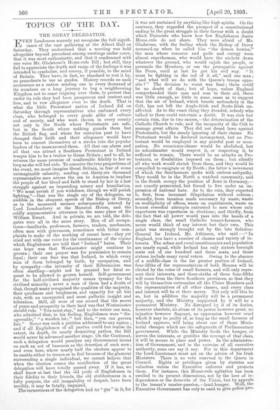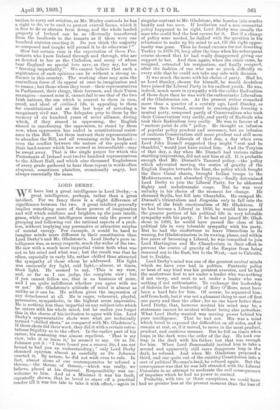TOPICS OF THE DAY.
THE GREAT DELEGATION. EVEN Londoners scarcely yet recognise the full signifi- cance of the vast gathering at the Albert Hall on Saturday. They understand that a meeting was held altogether beyond precedent among meetings under cover, that it was most enthusiastic, and that it condemned with one voice Mr. Gladstone's Home-rule Bill ; but still, they fail to appreciate the depth and range of the feelings it was intended to symbolise, and convey, if possible, to the mind of Britain. They have, in fact, no standard to test it by, no precedents to use as guides. History records no such occurrence as a nation sending one in every thousand of its numbers on a long journey to beg a neighbouring Kingdom not to cease reigning over them, to protest that under its rule they had been prosperous and content and free, and to vow allegiance even to the death. That is what the little Protestant nation of Ireland did on Saturday through representatives who embraced every class, who belonged to every grade alike of culture and of society, and who were chosen in every county not only in the North where Protestants are safe, but in the South where nothing guards them but the British flag, and where for centuries past to have changed their faith and their allegiance would have been to convert themselves at a stroke into the popular leaders of the mass around them. All that can alarm and all that can attract a Southern Protestant in Ireland tempts him to be a traitor to Great Britain ; and to all, he returns the same promise of unalterable fidelity to her so long as she will but rule. To conceive the true proportions of the event, we must imagine Great Britain, in fear of some unimaginable calamity, sending out thirty-six thousand representative men across the sea to America to implore the people of her blood and faith to stand by her in a last struggle against an impending misery and humiliation. " We must perish if you withdraw, though we will perish fighting,"—that was the single cry of the delegates, as audible in the eloquent speech of the Bishop of Derry, as in the measured menace subsequently uttered by Lord Londonderry at the Mansion House, and the coldly argumentative utterance in the same place of Sir William Ewart. And in private, we are told, the dele- gates were all in the same story. Men of all occupa- tions—landlords, professors, farmers, traders, mechanics, often men with grievances, sometimes with bitter com- plaints to make of the working of recent laws—they yet cried out with one voice for the continuance of the regime which Englishmen are told that "Ireland" hates. Their one hope was that Westminster might continue to govern ; their one prayer was for permission to remain loyal ; their one fear was that Ireland, to which every man of them belonged by birth, by occupation, and by sympath7—the intensity of their Hibernicism was often startling—might not be granted her fatal re- quest to be allowed to govern herself. Self-government for the half-civilised majority means tyranny for the civilised minority ; never a man of them had a doubt of that, though many recognised the qualities of the majority, their quickness and brightness, and capacity for all but rule, with an unexpected and most pathetic insight and toleration. Still, all were of one accord that the secret of peace and prosperity in their land was that Westminster should rule. " You must stay," said to the writer one man, who admitted that, to his feeling, Englishmen were " dis- agreeable," " a wooden lot ;" but then, " you can govern fair." Never was such a petition addressed to any nation ; and if all Englishmen of all parties could but realise its extent, its depth, its nearly despairing pathos, the Bill would never be advanced another stage. On the Continent, such a delegation would paralyse any Government intent on such an act of baseness as the desertion of such men ; and even here, where nearly half the electors appear to be unable either to reason or to feel because of the glamour surrounding a single individual, we cannot believe that when the election comes the recollection of the great delegation will have totally passed away. If it has, we shall know at last that the old pride of Englishmen in their fidelity to their friends, the old stubbornness in a lofty purpose, the old incapability of despair, have been terribly, it may be fatally, impaired, The earnestness of the delegation had no gae " in it, for it was not sustained by anything like high spirits. On the contrary, they regarded the prospect of a constitutional ending to the great struggle in their favour with a doubt which Unionists who know how few Englishmen desire Home-rule do not share. They were afraid of Mr. Gladstone, with the feeling which the Bishop of Derry summed-up when he called him " the demon bowler,' the ' man whose resource and guile and energy were almost superhuman, who would have the wickets down whatever the ground, who would cajole the people, or persuade the Members, or use the prerogative against the Peers, until at last he got his evil way. " It must be fighting in the ind of it all," said one man ; "and what will we do with the Queen's troops oppo- site ? " The decision to resist was final ; there could be no doubt of that ; but of hope, unless England comprehended their case and rose to their aid, there was little enough, so little in some cases as to suggest that the air of Ireland, which breeds melancholy in the Celt, has not left the Anglo-Irish and Scoto-Irish un- affected. As to the exact thing they dreaded, nobody who. talked to them could entertain a doubt. It was slow but certain ruin, due to two causes,—the determination of the Catholic Church to rule, and the incapacity of the Celt to manage great affairs. They did not dread laws against Protestants, but the steady ignoring of their claims. No Protestant would be declared incompetent, but no Pro- testant would be employed in any gainful post or occu- pation. No conscience-clause would be abolished, but no schoolmaster would respect it, or respecting it, be suffered to remain. There would be no attacks on Pro- testants, or disabilities imposed on them ; but silently all who work would shrink from them, and they would be compelled to emigrate or fly North ; the latter a movement of which the Southerners spoke with curious antipathy. They would be in the North a watched community, and in the South occupy the position of Jews in Germany,— not exactly persecuted, but forced to live under an im- pression of national hate. As to the ruin, they expected it, first, from incessant dilapidation without redress ; secondly, from taxation made necessary by waste, waste on multiplicity of offices, waste on experiments, waste on honest remedial attempts entrusted to men whose only expertness was expertness in elections ; and thirdly, from the fact that all power would pass into the hands of a single class, the small Catholic tenant-farmers, who never would think of any interest but their own. This point was strongly brought out by the late Solicitor- General for Ireland, Mr. Atkinson, who said :—" In England, you have a number of classes and variety of in- terests. The urban and rural constituencies and population are nearly equal, while Ireland has only sixteen borough seats out of one hundred and three seats, and those sixteen include many rural voters. Owing to the absence of a middle-class in the far greater portion of Ireland, four-fifths of the representatives of both Houses will be elected by the votes of small farmers, and will only repre- sent their interests, and three-sixths of these four-fifths will come from the three Southern provinces, so that they will by themselves outnumber all the Ulster Members and the representatives of all other classes, and every class and interest will be at their mercy. Not only will this be so, but in addition the majority will be a permanent majority, and the Ministry supported by it will be a permanent Ministry. No disregard by it of its duties. however absolute, no abuse of its power however great, no injustice however flagrant, no oppression however cruet which it may be guilty of, so long as the small farmers of Ireland approve, will bring about one of those Minis- terial changes which are the safeguards of Parliamentary government. While the Ministry feeds the hunger, or serves the interests, or gratifies the revenge of that class, it will be secure in place and power. In the administra- tion of Government, and in the exercise of all executive authority, none can say it nay. For in this department the Lord-Lieutenant must act on the advice of his Irish Ministers. There is no veto reserved to the Queen in Council. Rights or privileges given by statutes are valueless unless the Executive enforces and protects them. For instance, this Home-rule agitation has been swelled to its present dimensions, not by the love of in- dependence or the demerits of the Union, but by appeals W to the tenant's master-passion,—land-hunger. Well, the Executive Government has only to omit to give police pro.. tection to carry out eviction, as Mr. Morley contends he has a right to do, or to omit to protect evicted farms, which it is free to do or abstain from doing, and the whole landed property of Ireland can be as effectually transferred from the landlords to the tenants as if there were one hundred statutes enacting it. Do you think the majority so composed and taught will permit it to do otherwise ? " Slow but certain ruin is the expectation of those Pro- testants who know Ireland through and through, who are as devoted to her as the Catholics, and many of whom bear England no special love save, as they say, for her freezing impartiality." We cannot believe that such a registration of such opinions can be without a strong in- fluence in this country. The working class may miss the marvellous force of its appeal at once to imagination and to reason ; but those whom they trust—their representatives in Parliament, their clergy, their foremen, and their Union managers—cannot miss it, cannot fail to see that of the two Irish nations, the one which is nearest to them in race, creed, and ideal of civilised life, is appealing to them for constitutional aid as the last hope of arresting a sanguinary civil war. The delegates pray to them by the memory of six hundred years of strict alliance, during which, if they sinned in oppressing, the English sinned in sanctioning the oppression, to stand by them now, when oppression has ended in constitutional resist- ance to this Bill. Let them instruct their representatives to abandon the Bill, and all remaining evils in Ireland— even the conflict between the nature of the people and their land-tenure which has seemed so irremediable—may be swept away. That is the single prayer for which the Protestants of Ireland sent twelve hundred representatives to the Albert Hall, and which nine thousand Englishmen of every grade gathered to hear them repeat in words often eloquent, sometimes plaintive, occasionally angry, but always essentially the same.



















































 Previous page
Previous page